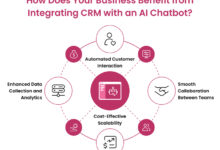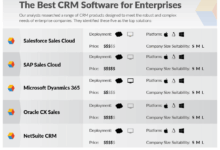AI-Powered CRM Software: Revolutionizing Customer Relations
AI-Powered CRM Software is transforming how businesses manage customer relationships. This technology leverages artificial intelligence to automate tasks, analyze data, and provide valuable insights, ultimately leading to improved efficiency, increased sales, and enhanced customer satisfaction. We will explore the core functionalities, benefits, implementation, and future trends of this powerful tool, examining how it differs from traditional CRM systems and the significant impact it has on modern business strategies.
From predictive analytics that anticipate customer needs to automated lead scoring that prioritizes high-potential prospects, AI-powered CRM systems are revolutionizing sales and marketing efforts. This detailed exploration will delve into specific AI features, such as machine learning and natural language processing, showcasing their practical applications within the CRM environment and providing a clear understanding of their potential return on investment.
Defining AI-Powered CRM Software
AI-powered CRM software represents a significant evolution in customer relationship management, leveraging artificial intelligence to automate tasks, analyze data, and ultimately improve business outcomes. It goes beyond the capabilities of traditional CRM systems by adding intelligent features that enhance efficiency and provide deeper insights into customer behavior.
AI-powered CRM software integrates various AI functionalities to streamline operations and improve decision-making. Core functionalities include automated lead scoring and qualification, predictive analytics for sales forecasting and customer churn prediction, personalized customer interactions through chatbots and recommendation engines, and advanced reporting and data visualization to track key performance indicators (KPIs). These features work together to create a more efficient and effective system for managing customer relationships.
Core Functionalities of AI-Powered CRM Software
AI-powered CRMs offer a range of functionalities designed to enhance efficiency and improve customer interactions. These include intelligent lead routing, prioritizing high-potential leads based on predictive scoring; automated email marketing campaigns, personalizing messages based on customer behavior and preferences; and proactive customer support, anticipating and addressing customer needs before they escalate into issues. Sales teams benefit from AI-driven sales forecasting, helping them anticipate future sales trends and adjust their strategies accordingly. Furthermore, AI facilitates the creation of detailed customer profiles, providing a 360-degree view of each customer’s interactions with the business.
Key Differences Between Traditional CRM and AI-Powered CRM
Traditional CRM systems primarily focus on data storage and retrieval, offering basic functionalities like contact management and sales pipeline tracking. AI-powered CRM systems, however, go far beyond this by incorporating machine learning and predictive analytics to automate tasks, provide insightful predictions, and personalize customer experiences. The key difference lies in the level of automation and intelligence: traditional CRMs require manual input and analysis, while AI-powered CRMs automate many of these processes, providing valuable insights and predictions without human intervention. This leads to significant improvements in efficiency, accuracy, and overall effectiveness in managing customer relationships.
Examples of AI Features Integrated into CRM Systems
Several AI features are commonly integrated into CRM systems to enhance their capabilities. Predictive analytics, for instance, uses historical data to forecast future trends, such as sales revenue or customer churn. Lead scoring automatically assigns scores to leads based on various factors, prioritizing those most likely to convert into customers. Sentiment analysis assesses customer feedback from various sources, such as social media and surveys, to gauge customer satisfaction and identify potential issues. Chatbots provide instant customer support, answering common questions and resolving simple issues, freeing up human agents to focus on more complex tasks. Recommendation engines suggest products or services to customers based on their past behavior and preferences, leading to increased sales and improved customer engagement.
Comparison of Leading AI-Powered CRM Platforms
The following table compares three leading AI-powered CRM platforms, highlighting their strengths and weaknesses. Note that specific features and pricing can vary depending on the chosen plan and integration.
| Feature | Salesforce Einstein | Microsoft Dynamics 365 AI | HubSpot CRM with AI features |
|---|---|---|---|
| Predictive Lead Scoring | Excellent, highly customizable | Strong, integrates well with other Microsoft products | Good, user-friendly interface |
| Sales Forecasting | Advanced forecasting models | Reliable forecasts, integrates with Power BI | Provides basic forecasting capabilities |
| Customer Segmentation | Highly sophisticated segmentation tools | Robust segmentation features | Good, but less advanced than Salesforce or Dynamics |
| Chatbots | Highly customizable and sophisticated chatbots | Integrated chatbot functionality | Offers basic chatbot functionality |
| Pricing | High, but offers a wide range of features | Mid-range pricing, good value for money | Affordable, suitable for smaller businesses |
| Ease of Use | Steeper learning curve | Relatively easy to use, especially for Microsoft users | Very user-friendly |
Benefits of AI in CRM
AI is revolutionizing Customer Relationship Management (CRM) by automating tasks, providing insightful data analysis, and personalizing customer interactions. This leads to significant improvements in efficiency, customer satisfaction, and ultimately, profitability. The integration of AI offers a powerful way to leverage data and improve business outcomes.
AI enhances customer relationship management by streamlining various processes, allowing businesses to focus more on building meaningful relationships with their customers. This shift from task-oriented work to relationship-building fosters loyalty and increases customer lifetime value. The efficiency gains translate directly into a better return on investment.
Impact of AI on Sales Team Efficiency
AI significantly boosts sales team efficiency by automating repetitive tasks such as data entry, lead qualification, and appointment scheduling. This frees up valuable time for sales representatives to focus on higher-value activities like building relationships with potential clients and closing deals. For example, AI-powered lead scoring systems can prioritize leads based on their likelihood to convert, ensuring sales teams focus their efforts on the most promising prospects. This targeted approach increases conversion rates and shortens the sales cycle. Furthermore, AI-driven sales forecasting tools provide accurate predictions of future sales, enabling better resource allocation and strategic planning. A company utilizing AI for sales forecasting might predict a 15% increase in sales next quarter based on current market trends and lead pipeline analysis, allowing them to proactively adjust their staffing and marketing strategies.
AI Improvements in Customer Service Interactions
AI-powered chatbots and virtual assistants provide instant support to customers, resolving simple queries and freeing up human agents to handle more complex issues. This leads to faster response times and improved customer satisfaction. For instance, a chatbot can instantly answer frequently asked questions about shipping times or product specifications, leaving human agents to deal with more nuanced customer problems, such as returns or complaints requiring empathetic human intervention. AI-driven sentiment analysis can also identify unhappy customers and escalate their issues to human agents, ensuring prompt resolution and preventing negative word-of-mouth. Imagine a system detecting negative sentiment in a customer email, automatically flagging it for a human agent, and even suggesting a pre-written apology or solution based on the context of the complaint.
Potential ROI Improvements from Implementing AI-Powered CRM
Implementing AI-powered CRM can lead to significant ROI improvements through increased sales, reduced operational costs, and improved customer satisfaction. The automation of repetitive tasks lowers labor costs, while improved lead qualification and sales forecasting increases revenue. Furthermore, enhanced customer service leads to greater customer retention and loyalty. For example, a study by Gartner found that companies using AI in their CRM saw a 25% increase in sales productivity and a 15% reduction in customer service costs. Another example might be a company that reduces its customer support agent headcount by 10% after implementing an AI-powered chatbot, leading to significant savings in salaries and benefits while maintaining or even improving customer satisfaction levels. The precise ROI will vary depending on the specific implementation and the size of the business, but the potential for significant gains is undeniable.
AI Features and Applications
AI significantly enhances CRM functionality, moving beyond basic contact management to offer predictive insights and automated processes. This section details key AI features and their applications within a modern CRM system.
Machine Learning in Lead Qualification and Prioritization
Machine learning algorithms analyze various data points – website activity, email engagement, social media interactions, and purchase history – to assess lead quality. This predictive scoring system prioritizes high-potential leads, allowing sales teams to focus their efforts effectively. For instance, a lead who frequently visits product pages, downloads white papers, and engages with marketing emails might receive a higher score than a lead who only visited the homepage once. This allows sales representatives to concentrate on leads most likely to convert, improving sales efficiency and revenue generation.
Workflow Automation of Repetitive CRM Tasks
AI automates numerous repetitive tasks, freeing up valuable employee time. A typical workflow might involve: (1) A new lead enters the CRM system; (2) AI automatically assigns the lead to the appropriate sales representative based on territory, product interest, or other criteria; (3) AI enriches the lead profile with data from various sources; (4) Automated email sequences are triggered based on pre-defined rules and lead behavior; (5) Follow-up reminders are automatically generated for sales representatives; (6) Progress updates are automatically logged within the CRM. This automated process streamlines the sales cycle and reduces manual data entry, minimizing errors and increasing overall productivity.
AI Features Improving Sales Forecasting Accuracy
Several AI features contribute to more accurate sales forecasting. These include:
- Predictive analytics: AI algorithms analyze historical sales data, market trends, and economic indicators to predict future sales performance with greater precision than traditional methods. For example, an AI model might predict a sales increase of 15% in Q4 based on past seasonal trends and current marketing campaigns.
- Demand forecasting: AI analyzes various factors – such as customer demographics, purchase patterns, and social media sentiment – to forecast future demand for specific products or services. This helps businesses optimize inventory levels and production planning.
- Sales pipeline analysis: AI provides real-time insights into the sales pipeline, identifying potential bottlenecks and opportunities for improvement. This allows for proactive adjustments to sales strategies and improved forecasting accuracy.
By incorporating these features, businesses can make data-driven decisions, optimize resource allocation, and achieve more accurate sales forecasts.
Natural Language Processing Enhancing Customer Communication
Natural language processing (NLP) enhances customer communication within the CRM by enabling features such as:
- Automated chatbots: AI-powered chatbots provide instant support to customers, answering frequently asked questions and resolving simple issues. This improves customer satisfaction and frees up human agents to handle more complex inquiries.
- Sentiment analysis: NLP analyzes customer feedback from emails, surveys, and social media to gauge customer sentiment. This allows businesses to identify areas for improvement and proactively address negative feedback. For instance, detecting negative sentiment in customer reviews can prompt immediate action to address the issue and prevent further damage to brand reputation.
- Automated email responses: AI can automatically generate personalized email responses based on customer inquiries, improving response times and enhancing customer experience. This allows for quicker resolution of customer issues and a more efficient use of human resources.
NLP significantly improves the efficiency and effectiveness of customer interactions.
Implementation and Integration
Implementing AI-powered CRM software requires careful planning and execution to ensure a smooth transition and maximize the benefits of AI capabilities. Successful implementation hinges on a phased approach, addressing data migration, system integration, and user training effectively. Ignoring these crucial steps can lead to delays, integration issues, and ultimately, a failure to realize the full potential of the AI-powered CRM.
Step-by-Step Guide for Implementing AI-Powered CRM Software
A successful implementation follows a structured process. This involves careful planning, phased rollout, and ongoing monitoring and adjustment. The following steps outline a typical implementation pathway.
- Needs Assessment and Planning: Begin by thoroughly assessing your business needs and identifying specific areas where AI can improve efficiency and effectiveness. This involves defining clear objectives, identifying key performance indicators (KPIs), and selecting the appropriate AI-powered CRM solution that aligns with these goals. Consider factors like scalability, integration capabilities, and the level of AI sophistication needed.
- Data Migration and Cleansing: Migrating existing CRM data to the new AI-powered system is a critical step. This involves cleaning, transforming, and validating data to ensure accuracy and consistency. Data quality directly impacts the accuracy and effectiveness of AI algorithms. This process should include identifying and resolving data inconsistencies, duplicates, and missing values.
- System Integration: Integrate the AI-powered CRM with existing systems, such as marketing automation platforms, ERP systems, and other relevant business applications. This integration ensures seamless data flow and avoids data silos. Careful planning and testing are essential to minimize disruptions during integration.
- User Training and Adoption: Provide comprehensive training to users on how to effectively utilize the new AI-powered CRM system. This training should cover all aspects of the system, including data entry, reporting, and the use of AI-powered features. Encourage user feedback to continuously improve the system’s usability and effectiveness.
- Monitoring and Optimization: Continuously monitor the performance of the AI-powered CRM system and make necessary adjustments to optimize its effectiveness. This includes tracking KPIs, analyzing user feedback, and refining AI algorithms based on performance data. Regular updates and maintenance are also crucial.
Challenges of Integrating AI-Powered CRM with Existing Systems
Integrating AI-powered CRM software with legacy systems can present significant challenges. These challenges often stem from data format incompatibilities, differing system architectures, and the need for robust data synchronization mechanisms. For example, integrating with an older CRM system that lacks a robust API might require custom development, increasing implementation costs and complexity. Another common challenge involves ensuring data consistency across multiple systems, preventing discrepancies that could hinder the accuracy of AI-driven insights.
Best Practices for Data Migration During AI-CRM Implementation
Effective data migration is crucial for a successful AI-CRM implementation. Best practices include thorough data cleansing before migration, employing incremental migration strategies to minimize disruption, and utilizing automated data transformation tools to ensure accuracy and efficiency. A well-defined data mapping process is essential to ensure that data fields are correctly mapped between the old and new systems. Regular data quality checks during and after migration are vital to identify and address any issues promptly. Consider using a phased approach to migration, starting with a pilot group or a subset of data before migrating the entire dataset.
Importance of Data Quality for Effective AI Functionality in CRM
High-quality data is paramount for the effective functioning of AI in CRM. Inaccurate, incomplete, or inconsistent data can lead to flawed AI predictions and recommendations, undermining the value of the system. Data quality encompasses accuracy, completeness, consistency, timeliness, and relevance. For instance, inaccurate contact information can lead to failed marketing campaigns, while incomplete customer profiles limit the ability of AI to personalize interactions. Implementing robust data governance processes, including data validation rules and regular data cleansing, is essential to ensure the quality of data fed into the AI system. Investing in data quality upfront significantly reduces the risk of downstream issues and maximizes the return on investment in AI-powered CRM.
Future Trends in AI-Powered CRM
The landscape of AI-powered CRM is constantly evolving, driven by advancements in machine learning, natural language processing, and big data analytics. We’re moving beyond basic automation towards increasingly sophisticated systems capable of proactive engagement and predictive insights, fundamentally reshaping customer relationship management. This section explores key emerging trends and their potential impact on businesses.
The next five years will witness a significant acceleration in the adoption and sophistication of AI within CRM systems. This will be fueled by the increasing availability of data, improvements in AI algorithms, and a growing understanding of how to effectively leverage these technologies for business advantage. The focus will shift from simply automating tasks to using AI to gain a deeper understanding of customer behavior and preferences, leading to more personalized and effective interactions.
Hyper-Personalization and Predictive Analytics
Hyper-personalization, powered by advanced AI algorithms, will become a defining characteristic of future CRM systems. This goes beyond simple segmentation; it involves creating highly individualized customer experiences based on real-time data analysis, predicting future needs and behaviors. For example, an e-commerce platform could use AI to anticipate a customer’s next purchase based on their browsing history, past purchases, and even external factors like weather patterns (e.g., suggesting raincoats if rain is forecast). This level of personalization fosters stronger customer loyalty and increases conversion rates. Predictive analytics will play a crucial role, forecasting customer churn, identifying high-value prospects, and optimizing sales strategies. Companies like Netflix already utilize sophisticated recommendation engines based on these principles, demonstrating the potential for significant improvements in customer engagement and revenue generation.
AI-Driven Customer Service and Support
AI-powered chatbots and virtual assistants will continue to evolve, becoming more sophisticated and capable of handling increasingly complex customer inquiries. These systems will leverage natural language processing (NLP) to understand the nuances of human language, providing more natural and human-like interactions. Beyond simple FAQs, these AI agents will be able to access and process information from across the CRM system, providing personalized support and resolving issues efficiently. For instance, a customer contacting support about a product defect could have the issue automatically escalated to the relevant department, with all relevant customer information readily available. This leads to improved customer satisfaction and reduced response times.
Enhanced Sales and Marketing Automation
AI will further revolutionize sales and marketing processes by automating repetitive tasks, optimizing campaigns, and providing valuable insights into lead qualification and conversion. AI-powered tools can analyze large datasets to identify high-potential leads, predict which leads are most likely to convert, and personalize marketing messages for maximum impact. For example, a marketing team could use AI to segment its audience based on demographics, behavior, and preferences, ensuring that the right message reaches the right person at the right time through the optimal channel. This targeted approach maximizes marketing ROI and improves campaign effectiveness.
Innovative AI Applications in the Next 5 Years
The next five years will likely see the emergence of several innovative AI applications within CRM:
The increasing sophistication of AI will allow for more proactive and personalized customer engagement. For example, we can expect to see AI systems that automatically identify and address potential customer issues before they escalate, proactively offering assistance or solutions based on predictive analytics. Another area of innovation is the integration of AI with other business systems, enabling a more holistic view of the customer and creating a truly seamless customer experience across all touchpoints.
- AI-powered predictive churn modeling: More accurate predictions of customer churn, allowing for proactive interventions to retain valuable customers.
- Automated lead scoring and prioritization: AI will refine lead scoring to identify the most qualified leads, allowing sales teams to focus their efforts on the most promising prospects.
- Hyper-personalized product recommendations: AI will power highly personalized product recommendations, improving customer satisfaction and increasing sales conversions.
- Sentiment analysis for customer feedback: AI will analyze customer feedback across various channels to identify trends and areas for improvement.
Ethical Considerations of AI in CRM
The increasing reliance on AI in CRM raises several important ethical considerations that must be carefully addressed. Transparency, fairness, and accountability are paramount to ensure responsible and ethical use of AI in customer interactions.
- Data privacy and security: Ensuring the responsible collection, storage, and use of customer data in compliance with relevant regulations (e.g., GDPR, CCPA).
- Algorithmic bias and fairness: Mitigating biases in AI algorithms to prevent discriminatory outcomes in customer interactions.
- Transparency and explainability: Providing transparency into how AI systems make decisions and ensuring that they are explainable to customers and stakeholders.
- Accountability and oversight: Establishing clear lines of accountability for the use of AI in CRM and implementing appropriate oversight mechanisms.
- Customer consent and control: Ensuring that customers have control over their data and are given clear choices about how their data is used by AI systems.
Case Studies of Successful AI-CRM Implementations
The effective implementation of AI-powered CRM systems has yielded significant improvements in various sectors. Examining successful case studies reveals key strategies and quantifiable results that can inform future deployments. These examples highlight the transformative potential of AI in streamlining operations and enhancing customer relationships.
AI-Powered CRM Implementation at a Large Financial Institution
This case study focuses on a major financial institution’s successful implementation of an AI-powered CRM system to improve customer service and sales efficiency. The institution, facing challenges with managing large volumes of customer data and providing personalized service, adopted a sophisticated AI-CRM solution.
The key factors contributing to the success of this implementation were a clear definition of objectives, robust data integration, thorough employee training, and a phased rollout approach. The institution prioritized integrating its existing CRM data with the AI system, ensuring a seamless transition and minimizing disruption. Furthermore, comprehensive employee training programs ensured staff were adequately equipped to utilize the AI-powered features effectively. The phased rollout allowed for iterative improvements and addressed any unforeseen challenges along the way.
Quantifiable results included a 25% increase in customer retention rates within the first year, a 15% improvement in lead conversion rates, and a 20% reduction in customer service call handling time. These improvements directly translated into increased revenue and enhanced customer satisfaction.
Visual Representation of Improved Workflow
The illustration depicts two scenarios: the pre-AI and post-AI workflow. The pre-AI workflow shows a cluttered and disorganized scene with multiple employees manually handling customer interactions, data entry, and reporting, depicted as individuals surrounded by overflowing in-trays and scattered paperwork. Arrows show the chaotic flow of information, indicating delays and inefficiencies. The post-AI workflow shows a streamlined and organized process. Employees are shown using sleek, modern interfaces with dashboards displaying key metrics and customer insights. The AI system is represented as a central hub, efficiently processing data, automating tasks, and providing personalized recommendations. Arrows now flow smoothly and directly, highlighting the efficiency and automation achieved through the AI-CRM implementation. The overall color palette shifts from muted and stressful tones in the pre-AI scenario to bright and positive colors in the post-AI depiction, symbolizing the improvement in productivity and morale. The visual emphasizes the transition from manual, fragmented processes to automated, integrated workflows.
Final Summary
In conclusion, AI-powered CRM software represents a significant advancement in customer relationship management. By automating repetitive tasks, providing insightful analytics, and personalizing customer interactions, it empowers businesses to achieve unprecedented levels of efficiency and customer satisfaction. While implementation challenges exist, the potential benefits – increased sales, improved customer service, and a stronger ROI – make AI-powered CRM a compelling investment for businesses seeking to thrive in today’s competitive landscape. The future holds even more exciting possibilities, with advancements in hyper-personalization and other innovative AI applications poised to further revolutionize the CRM industry.




